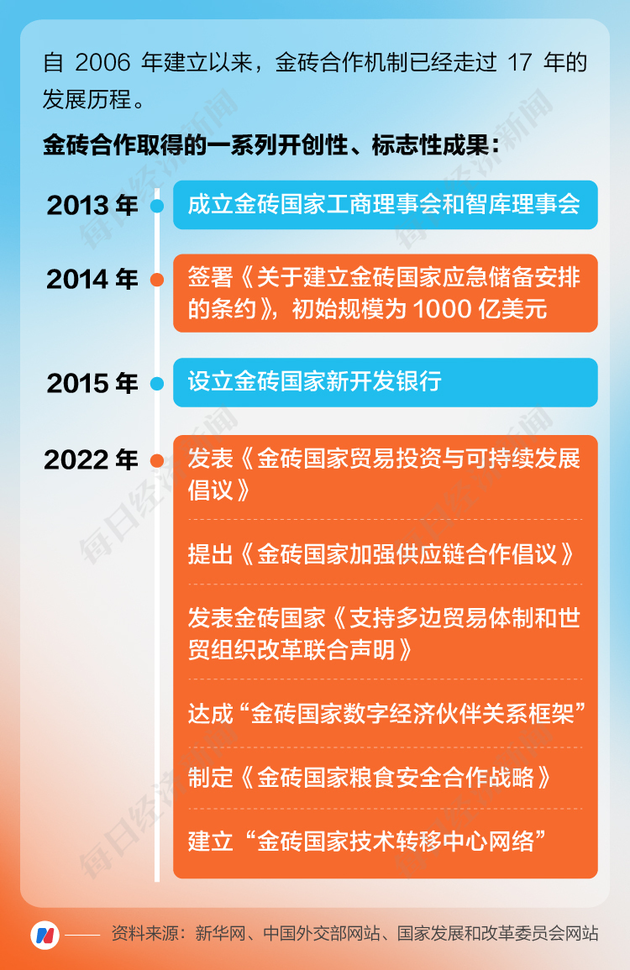
The 15th BRICS Summit will be held at the Sandton International Convention Centre in Johannesburg, South Africa from August 22 to 24. The theme of this summit is "BRICS and Africa: Partnership for Mutually Accelerated Growth, Sustainable Development and Inclusive Multilateralism".
This will be the first offline summit held by the BRICS countries since the outbreak of the COVID-19 pandemic. The scale of the event has reached a new level and has attracted widespread global attention.
According to South African Minister of International Relations and Cooperation, Pandor, leaders from 23 countries, including Argentina, Ethiopia, Algeria, Cuba, Egypt, Indonesia, Iran, Thailand, and Vietnam, have officially expressed their intention to join the BRICS mechanism.
Strengthening economic cooperation among developing countries and jointly resisting global economic risks has also become one of the key topics of discussion at the summit.
Against the backdrop of the United States increasingly "weaponizing" the US dollar, how can developing countries reduce their dependence on the dollar? How can the BRICS cooperation mechanism promote the sustainable development of developing countries, including African countries? These are urgent topics that participating countries want to discuss.
Prior to the summit, National Business Daily (NBD) invitedAna Elisa Saggioro Garcia, general coordinator and researcher of the BRICS Policy Center.
Ana Elisa Saggioro Garcia (hereinafter referred to as Ana Garcia), the General Coordinator of the BRICS Policy Center in Brazil, Alissa Wang, Co-Chair of the BRICS Research Group at the University of Toronto, and Carlos Correa, Executive Director of the South Centre, an important think tank established by developing countries, to share their insights.
What makes BRICS attractive with over 20 countries applying for membership?
NBD: This year's BRICS summit is the first offline event since the outbreak of the pandemic. What are the important topics to be discussed at this summit?
Ana Garcia: This summit is a significant political moment for BRICS countries. The first formal meeting of BRICS leaders took place in 2008 after the global financial crisis. At that time, the common demand of member countries was to reform international institutions such as the International Monetary Fund (IMF) and the World Bank, in order to enhance the representation of emerging economies in these institutions. Now we need to promote a multipolar international order to balance the U.S. hegemony.
So, I believe the two most important topics at this summit are the "membership expansion" of BRICS and the issue of the dominance of the U.S. dollar.
Alissa Wang: The BRICS faces several important challenges and issues.
Institutionally, the biggest topic concerning the BRICS is membership expansion. Important questions in this regard include how it will navigate this process, which countries will join and when, what the membership criteria will be, etc.
Economically, the BRICS faces the core question of how it can continue to fulfill its distinctive mission of serving the common economic interests of emerging economies and developing countries. For example, there is currently talk of creating a common BRICS currency to reduce dependence on the US dollar – but how this might be implemented, when, and whether or not it is feasible – all of these are questions that are open to discussion.
Carlos Correa: I believe the most important topic is the reform of the international financial system, as the financial institutions under the Bretton Woods system are no longer able to adapt to the realities of the 21st century or respond to the needs of developing countries. Low- and middle-income countries face significant debt pressures, and debt restructuring is urgently needed. A comprehensive plan should be put forward to help them overcome difficulties and meet the development needs of their people.
NBD: Currently, more than 20 countries are seeking to join the BRICS mechanism. What makes BRICS attractive to these applicant countries?
Ana Garcia: Currently, BRICS countries have become attractive to all countries that have not been treated or valued fairly. Countries like Iran and Venezuela are attracted to BRICS because they are under sanctions, while Argentina is attracted due to its economic crisis and inability to access U.S. dollars and other international financial resources. The expansion of BRICS will be a central topic at this summit, sending a strong signal to the outside world that we are open to accepting new members and will analyze and discuss the admission criteria and timeline.
Alissa Wang: Joining the BRICS will offer many concrete economic benefits to these potential new candidate countries, as it allows them to be integrated into a network of leading developing countries and emerging economies and thus opens up many new opportunities for economic cooperation, increase trade ties, collaborate in infrastructure projects, etc.
At a more general level, these countries will also benefitbecause they align with the BRICS mission to create a more inclusive global order and to give developing countries a greater say in global governance. Emerging economies and developing countries in the global south want to be represented in global economic decision-making; they want to have a say in global governance; and overall, they want the global order to serve their interests.
Developing countries and emerging economies hope to participate in the decision-making process of the global economy and have their interests protected by the global order. BRICS provides them with a platform. Becoming a member of BRICS means joining a "united front" that speaks for developing countries from their perspective.
And the BRICS provides a platform for these developing countries to come together, discuss issues from their perspective, discuss their common interests and priorities, and contribute to shaping the future of the global economic order. Being a member of the BRICS means joining an institution or a "united front" that speaks for developing countries, from the perspective of developing countries.
NBD: Currently, BRICS has not yet established clear standards and procedures for admitting new members. What challenges do you think exist in this regard?
Ana Garcia: In Brazil, President Lula believes that membership expansion of BRICS would be beneficial for Brazil in the long run. However, for diplomats and other government officials involved in actual negotiations, it is a different matter because reaching consensus among the five member countries is very difficult. They need to discuss clear standards and decide which countries will join first, among other issues.
Alissa Wang: There will be several main challenges to forging a consensus among the existing BRICS members. The first challenge is agreeing on which countries will be admitted. Currently, we know that more than 20 countries have expressed their interest.
Another challenge is deciding on the logistical issues of when and how membership expansion will proceed. The development of clear and fair criteria for admission would be a top priority.
Carlos Correa: Indeed, establishing admission standards for new members is a major challenge, but I believe it can be resolved in the end. Expansion is beneficial for both existing and new member countries.

"De-dollarization"? It won't happen quickly
NBD: The discussion on "de-dollarization" is spreading globally. What is your view on this trend?
Ana Garcia: Indeed, after the Western sanctions on Russia, many countries have sought to use alternative currencies to escape the dominance of the US dollar. However, it is currently difficult to find a currency that can fully replace the dollar, as such a currency requires open financial markets and the credibility of central banks, which is still challenging to achieve and operate.
Nevertheless, the discussion on "de-dollarization" is important and a long-term topic. We have seen the New Development Bank issuing local currency bonds in South Africa, and this will become more frequent in the future. There will also be more discussions on a common currency among BRICS countries.
Alissa Wang: The growing trend of de-dollarization is one of the responses of the BRICS to an unequal and unjust global economic order. One of the BRICS’ distinctive founding missions is to serve the common interests of developing countries and emerging economies.
A common currency within the BRICS would facilitate the process of economic integration between BRICS members by facilitating trade and other economic transactions within the group and would also reduce its members’ dependence on the currently dominant US dollar so that the economic fate of these nations is no longer critically dependant on the United States. However, it is difficult to speak of realistic measures that could be taken at the moment, given the uncertainties surrounding the members’ views of the issue, as well as the many challenges that would naturally come with such a large project.
Carlos Correa: The process of "de-dollarization" has already begun, and I hope to see some new progress at the summit. The proportion of the US GDP in the global economy does not actually match the dominance of the dollar. The United States has benefited greatly from the dominance of the dollar. "De-dollarization" is in the interest of developing countries and will have a significant impact, but it will not happen quickly. It is not an immediate achievement.

BRICS countries can promote global governance through sustainable development and other means
NBD: UN Secretary General, African countries are also going to attend the summit. How can the BRICS mechanism help shape global governance and development, especially compared to the organizations controlled by developed countries (say G7)?
Alissa Wang: BRICS countries can focus on pragmatic cooperation to promote global governance and development.
For example, sustainable development is an important topic and an area where BRICS countries can achieve meaningful outcomes. BRICS countries can engage in cooperative discussions on substantial investments and infrastructure projects that align with sustainable development goals. The summit is the most suitable platform for such discussions.
Another topic is climate change. As China, Russia, and India are major carbon emitters, cooperation and mutual commitments within BRICS countries hold significant importance. Climate change is also a topic that creates divisions between developing and developed countries. The BRICS mechanism provides an excellent platform for developing countries to express their unique perspectives and seek solutions that reflect their demands and considerations.
Ana Garcia: The establishment of the New Development Bank by BRICS countries provides new credit resources for African and other developing countries. The entry of new players is crucial. Previously, decisions on who could access credit and investment and the direction of such investments were made by institutions under the Bretton Woods system. Therefore, it is of great significance for Africa and Latin America if new institutions can determine investment projects.
The New Development Bank needs to do more, especially in evaluating investment projects. It must consider whether they align with sustainable development goals and what impact they will have on social infrastructure. For example, there is a wind energy project in Brazil located within indigenous territories, which requires a balance between renewable energy development and respecting indigenous interests.
Carlos Correa: The more developing countries participate in the summit, the greater the influence of BRICS countries. In international affairs, the BRICS cooperation mechanism can become another platform apart from the G7 and G20, allowing developing countries to express their interests and concerns. Joining BRICS will enhance the influence of developing countries and thus influence decision-making in international affairs. In fact, in terms of GDP, trade, and manufacturing, the global participation of developing countries has significantly increased, but their weight is not fully reflected in decision-making in international affairs.
China, India, and Brazil are very active in South-South cooperation, especially with China's Belt and Road Initiative, which has laid a solid foundation for infrastructure development and growth in Africa. Additionally, the New Development Bank will play an important role because other international financial institutions often impose many conditions on financing that may not align with the interests of developing countries. The New Development Bank does not require such conditions when providing funding.


 川公网安备 51019002001991号
川公网安备 51019002001991号





